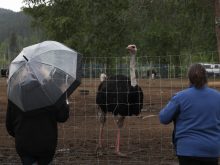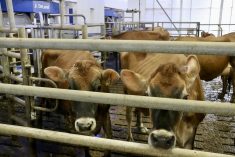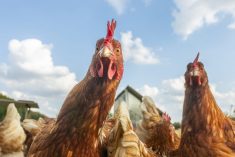A new appearance of highly pathogenic avian flu in birds at another farm on Newfoundland’s Avalon Peninsula isn’t expected to affect Canada’s status as free of avian flu.
The Canadian Food Inspection Agency reported Tuesday it had confirmed ‘high-path’ H5N1 avian influenza (AI) on Sunday in birds at an “additional” farm in the region.
It follows a high-path H5N1 outbreak confirmed Dec. 20 in birds at an exhibition farm, which had marked Canada’s first case of a high-path strain of AI in domestic birds since 2015.
Read Also

U.S. not ready to lift Mexican cattle ban over screwworm, Agriculture Secretary Rollins says
The U.S. is not yet ready to reopen its border to Mexican cattle amid an outbreak of the flesh-eating New World screwworm parasite, Agriculture Secretary Brooke Rollins said, but she is pleased with Mexico’s efforts to contain the pest.
As was the case on the first affected property, the “small flock farm” in the second case also does not produce birds for sale, CFIA said Tuesday.
More details about the second outbreak, the farm and types of birds affected weren’t yet available Wednesday.
CFIA said Tuesday that Canada’s status as “free from AI” remains in place, as per guidance from the World Organization for Animal Health (OIE).
The second detection also “should have no impact on trade,” CFIA said Tuesday, adding that the situation “serves as a strong reminder that AI is spreading across the globe in wild birds as they migrate to and from Canada.”
That means “anyone with farm animals, including birds, should practice good biosecurity habits to protect them from animal diseases,” the agency said.
Both farms are in a region the Newfoundland and Labrador provincial government promotes online to tourists as the “Seabird Capital of North America,” with “tens of thousands of migrating seabirds perched almost within arm’s length.”
Analysis of the flu virus in the December case showed it was genetically lined up with the “Eurasian lineage” of high-path H5N1 that’s been circulating in poultry and wild birds in Europe and Asia in recent months.
In a report filed Dec. 31 with the OIE, following up with the case at the first farm, the federal government said a wild bird — a great black-backed gull — was found dead Nov. 26 of avian flu in the St. John’s area, not far from the site of the exhibition farm outbreak.
In a separate Jan. 2 report, Ontario’s Feather Board Command Centre — an industry agency tracking both domestic and international bird disease outbreaks — said it’s believed a North Atlantic storm which hit that area of Newfoundland in early October may have “swept along” migrating waterfowl from northern Europe. –– Glacier FarmMedia Network













